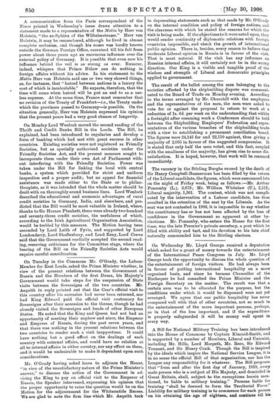On Monday Lord Wenlock moved the second reading of the
Thrift and Credit Banks Bill in the Lords. The Bill, he explained, had been introduced to regularise and develop a form of banking which had met with great success in other countries. Existing societies were not registered as Friendly Societies, but as specially authorised societies under the Friendly Societies Act, and the present measure sought to incorporate them under their own Act of Parliament with- out interfering with the Friendly Societies. Power was taken under the Bill for linking the local with central banks, a system which provided for strict and uniform inspection and a proper audit; but no appeal for financial assistance was made either to the State or to philan- thropists, as it was intended that the whole matter should be dealt with on thoroughly sound business lines. Lord Wenlock described the educational and economic advantages of rural credit societies in Germany, India, and elsewhere, and pre- dicted that the Bill would be most valuable in Ireland, where, thanks to Sir Horace Plunkett, there were already two hundred and 'seventy-three credit societies, the usefulness of which, according to the Irish Agricultural Organisation Association, would be trebled by this measure. The Motion having been seconded by Lord Leith of Fyvie, and supported by Lord Londonderry, Lord Shaftesbury, and Lord Reay, Lord Crewe said that the Government cordially accepted the second read- ing, reserving criticisms for the Committee stage, where the bearing of the Bill on the Friendly Societies Acts would require careful consideration.






































 Previous page
Previous page